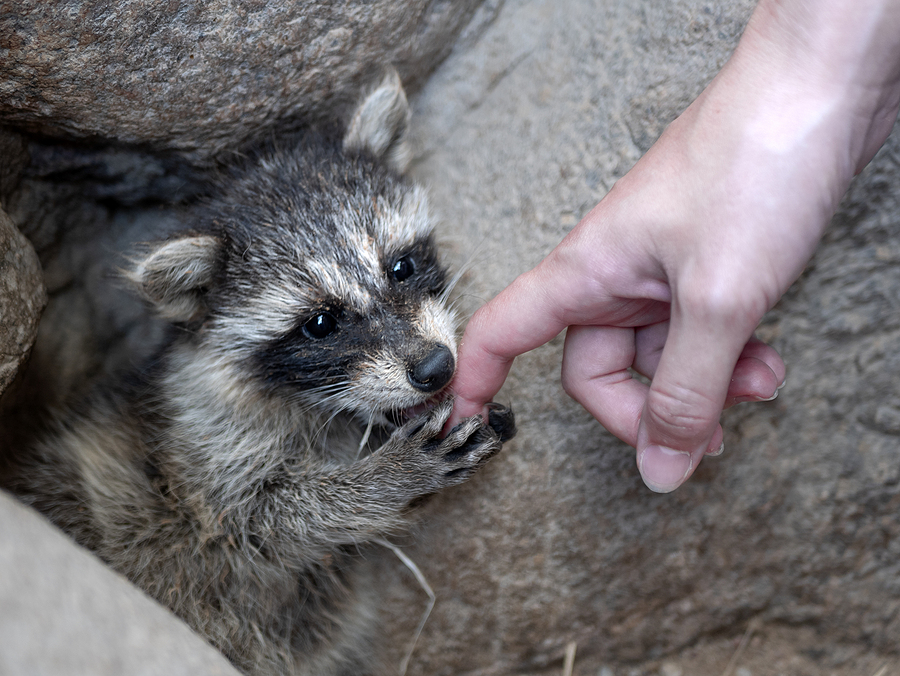If you’ve ever seen a baby raccoon, you know how adorable they are. But what should you do if you find one in the wild? Or your own backyard for that matter? Well, don’t worry – the pros at Indiana Raccoon Removal are here to help!
In this post, we’ll tell you what to do if you find a baby raccoon in Indianapolis, plus how to get in touch with one of our licensed and insured wildlife rehabilitators for emergency raccoon removal and control. Keep reading for more information.

Why is the Baby Raccoon Alone?
Baby raccoons are undisputed as one of the cutest little creatures out there. With big eyes and soft fur, it can be near impossible not to melt at the sight of one. And while they may look helpless, these babies are actually quite independent. Mother raccoons will often leave their babies alone for long periods of time as they go off to find food. But sometimes, baby raccoons get separated from their mothers and end up lost or stranded. This can be a dangerous situation for the little ones since they’re not yet able to take care of themselves.
Luckily, there are people out there who are willing to help these baby raccoons find their way back home. Wildlife rehabilitators like Indiana Raccoon Removal work tirelessly to reunite these babies with their mothers, and they rely on the public’s help to do so. If you see a baby raccoon that needs assistance, please don’t hesitate to reach out for help!
3 Steps to Take After Finding an Orphaned Raccoon Pup:
1. If you find a baby raccoon, don’t touch it. Don’t touch a baby raccoon if you find one. Wild animals can carry diseases that are dangerous to humans. Some species of raccoons also have a history of being aggressive, so it’s best to leave them alone.
2. Call a wildlife rehabilitator. If you find a baby raccoon, the best thing to do is to call a wildlife rehabilitator. They are specially trained to handle, relocate, and even abate woodland wildlife like these animals. So, they will know how to best help the raccoon. Please do not try to care for the raccoon yourself, as it is illegal in Indiana, plus you could put the animal in danger.
3. Provide the rehabilitator with as much information about the raccoon as possible. After finding a baby raccoon, contact a wildlife rehabilitator. Then provide the rehabilitator with as much information about the raccoon as possible. This includes where you found it, any injuries or illness you noticed and the age of the raccoon. If possible, have a photo of the animal ready for the rehabilitator to assist with identification.
Wildlife Control Tips for Raccoons
Raccoons can be a real nuisance around your property. They can cause a lot of damage, and they can be dangerous. If you have spotted raccoons around property, it is important to take steps to control them. There are a few things you can do to deter raccoons, and there are also a few things you can do to get rid of them if they become a problem.
One of the best ways to deter raccoons is to make sure your property is properly sealed up. Raccoons are very good at finding ways into buildings and homes, so make sure all your doors and windows are properly sealed. You can also install a fence around your property to keep raccoons out.
If raccoons have already started causing problems on your property, there are a few things you can do to get rid of them. One thing you can do is set up traps and catch them that way. You can also use deterrents like ammonia or pepper spray to scare them away. Finally, if the raccoons are becoming too much of a problem, you may need to contact an Indianapolis pest control service for professional coon removal.
Raccoon control is important if you have spotted them around your property. Taking steps to deter them and get rid of them can help keep your property safe from damage and potential danger. Don’t hesitate to take action if you have a raccoon problem! Indiana Raccoon Removal offers raccoon removal and control services in Indianapolis to help protect your home or business from these pesky critters. Contact us at 317-535-4605 for a free quote, today!
Related Posts:
3 Reasons a Raccoon is Dangerous to People and Pets
Communicable Diseases That Can Be Carried By Raccoons
Why Raccoons Are Attracted to Your Property Each Night
